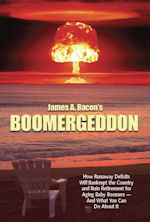About Bacon’s Rebellion
Bacon's Rebellion is Virginia's leading independent portal for news, opinions and analysis about state, regional and local public policy. Read more about us here.
The Grass Isn't Always Greener
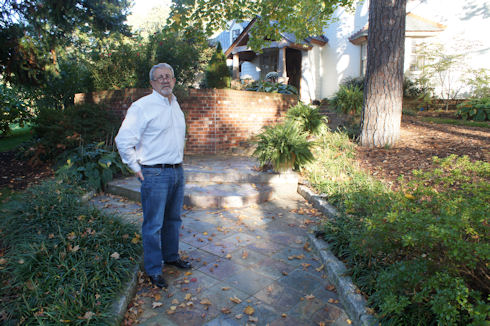 The de-lawning movement is slowly taking hold in the Richmond region. Converting grass into flower beds and vegetable gardens creates more attractive yards, cuts the expense of lawn maintenance and helps clean the Bay.
The de-lawning movement is slowly taking hold in the Richmond region. Converting grass into flower beds and vegetable gardens creates more attractive yards, cuts the expense of lawn maintenance and helps clean the Bay.
by James A. Bacon
About 20 years ago, Rick and Judy Grossberg moved into what he calls a "standard suburban house" on Westham Parkway in Henrico County. It had a big yard with a u-shaped driveway, some trees and a huge expanse of grass. Dissatisfied with both house and yard, he has worked a remarkable transformation over the years, adding new wings, building a back deck and converting much of the lawn into flower beds, hedges, mulch islands and an herb and spice garden in the back.
Dispensing with the driveway, Grossberg designed a small parking area close to the street and he added a series of steps and small landings leading up the slope to a shrubbery-lined retaining wall. The idea, he explains, was to create transitions from a public space on the street to a semi-public space midway up the steps, and then to a private space at a front stoop mostly screened from the neighbors .
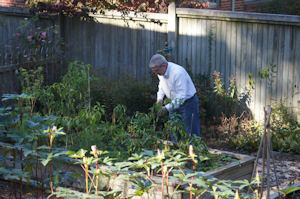 In the back, Grossberg fenced in a quarter of the yard and erected garden beds where his wife grows rosemary, thyme, parsley, oregano, hot peppers and other herbs and spices they use in cooking. While both spouses are serious "foodies," he concedes that Judy does most of the gardening. She plans the crops and handles the planting and weeding. His role, he smiles, is limited mainly to plucking herbs when they're needed in the kitchen.
In the back, Grossberg fenced in a quarter of the yard and erected garden beds where his wife grows rosemary, thyme, parsley, oregano, hot peppers and other herbs and spices they use in cooking. While both spouses are serious "foodies," he concedes that Judy does most of the gardening. She plans the crops and handles the planting and weeding. His role, he smiles, is limited mainly to plucking herbs when they're needed in the kitchen.
It would be an oversimplification to say that his plan was motivated by a desire to eliminate as much turf as possible. But a smaller lawn, which consumes only 60% of the expanse that it once did, was a tremendous fringe benefit, Grossberg says. He doesn't have much use for grass lawns. They're visually uninteresting, they require excessive maintenance, and they're an environmental blight. Says he: "I'd get rid of all of it, if I could."
There aren't many people like the Grossbergs in the suburban wonder world of Henrico County's West End, a locale where most homeowners still strive to maintain the greenest, best manicured lawn in the subdivision. The lawn, the origins of which can be traced to 17th-century English and Scottish noblemen, has become such a dominant fixture in North American suburbia that most people cannot imagine a yard without one. Indeed, the aesthetic standard of the well-tended lawn is so deeply embedded in municipal codes and homeowner-association covenants that it is effectively illegal to let the grass go to seed.
But the Grossbergs are not entirely alone. Lurking on the fringes of respectable society, a "de-lawning" movement is gathering strength. Patch by patch, homeowners are converting barren swaths of fescue and ryegrass into flower beds and vegetable gardens. Increasingly, Virginians are OK with the idea that their front lawn will never look like a putting green. Many are managing their lawns to reduce fertilizer run-off into the Chesapeake Bay. And a handful advocate a back-to-nature approach of reinventing lawns as meadows populated by prairie grasses that never need cutting or fertilizing.
Reasons to hate lawns
There are ample reasons to loath lawns. First and foremost for the typical suburban dweller with a half-acre of grass to mow, grass requires constant maintenance in order to keep it looking good.
Lawns also need to be trimmed, fertilized and aerated. Chemicals must be applied to eliminate pests ranging in Virginia from slime mold and gray leaf spot to white grubs and caterpillars. When rain is plentiful, mushrooms and other fungi proliferate. When rainfall is deficient, the grass turns brown -- unless you can afford an irrigation system, another major expense. Keeping a lawn in tip-top shape requires loads of work -- unless you outsource it to landscapers, in which case it requires more money.
Making matters worse for Virginians, says Pattie Bland, coordinator of the Master Gardener program in Hanover County, "You're fighting against nature. You're introducing a species that's not well suited to local climatic conditions." Virginia, she explains, is situated in a transitional zone between northern, cool-season grasses and southern warm-season grasses, with the result that neither type thrives here.
Lawns are odious for environmental reasons as well. Short-cropped grasses may not be as bad as concrete and asphalt but they don't do as much as flower beds and rain gardens to absorb rain and slow water run-off. Also, fertilizer washes into creeks and streams, ultimately ending up in the Chesapeake Bay and its major tributaries where it feeds fish-killing algae blooms.
Moreover, turf grass is an ecological desert. Unlike natural prairie grasses and wild flowers, which typically grow three or more feet tall, grass lawns don't provide a habitat for much more than grubs and worms. Lawns do nothing to support bumble bees, butterflies and other pollinators. They provide no cover to ground-nesting birds or other wildlife.
Every Saturday May through October, the St. Stephens Episcopal Church hosts a farmers market. In one of the tents, volunteers from the Hanover County Master Gardener's program provide advice to homeowners who need help cultivating flowers, shrubs and garden vegetables. If you visit, you can catch an earful from the volunteers, who donate their time as a condition of earning their master gardener certificates. Real gardeners, they say, don't have much use for grass lawns.
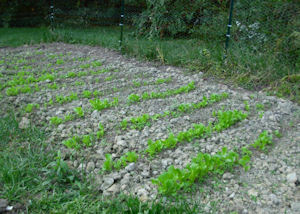 "The perception that you have to have a beautiful lawn is just crazy," offered Bill Murrill one recent Saturday. True to his beliefs, Murrill has let much of the lawn in his "typical West End neighborhood" return to its natural state. In the back yard, a vegetable garden contains three five-by-ten foot beds. A front-yard bed alternates between leafy greens in the spring and flowers in the summer.
"The perception that you have to have a beautiful lawn is just crazy," offered Bill Murrill one recent Saturday. True to his beliefs, Murrill has let much of the lawn in his "typical West End neighborhood" return to its natural state. In the back yard, a vegetable garden contains three five-by-ten foot beds. A front-yard bed alternates between leafy greens in the spring and flowers in the summer.
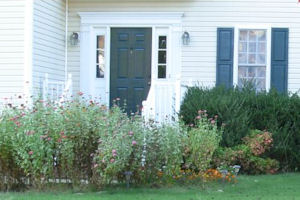 "I do have some lawn area," says Murrill, "but I stopped fertilizing and watering it several years ago. I don't mow it that often so that I can harvest enough clippings for my compost pile."
"I do have some lawn area," says Murrill, "but I stopped fertilizing and watering it several years ago. I don't mow it that often so that I can harvest enough clippings for my compost pile."
Nancy Reinhardy, who lives in the city, also has scaled back her lawn. Says she: "There is a trend away from the big lawn. You can do things that really enhance the property" by converting grass to flower beds, as she has done. She still has grass in her yard, she says, but she uses it as an accent.
It's not the job of the he Master Gardener program, which operates as part of the Virginia extension service, to bias homeowners against grass lawns, says Dave Close, the Blacksburg-based coordinator of Virginia's master gardener program. But he agrees that it makes sense to cultivate plants that are part of Virginia's naturally occurring ecology and that are adapted to local soils, beneficial insects, pollination and the like. Not many common lawn grasses meet that qualification.
While the extension service is agnostic on the subject of lawns, it does encourage homeowners to prevent soil erosion and reduce fertilizer runoff into the Chesapeake Bay. "The first step," says Bland with the Hanover County master gardeners, "is being fastidious with your lawn practices."
Dig a little deeper, though, and Bland recommends perennials, wildflowers or even native prairie grasses such as Little Blue Stem and Switchgrass that are adapted to local conditions and need less "fussing over." She points to the Virginia Department of Transportation's sowing of wild flowers along state highways as an alternative landscaping approach. People love the flowers, she says, and they cut down on the expense of mowing.
The war on turf
A fringe of the horticultural movement takes a far more aggressive stance. Susan Harris, a native Richmonder who now lives in Greenbelt, Md., is founder of the Lawn Reform Coalition, which has the tagline, "Grass isn't always greener."
"I had a big lawn. I got tired of lawn care. I'm bored by lawns," says Harris, a self-professed garden coach and blogger. "I'm an avid gardener. I would rather grow something interesting."
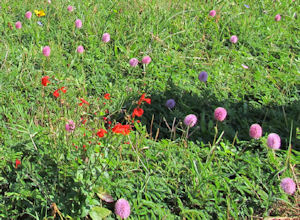 For homeowners determined to stick with grass, she advocates taking the "freedom lawn" approach. Just lower your expectations. Your lawn doesn't have to look like the Augusta Country Club golf course, she says. "You can have a good-enough lawn without putting toxic products on it, without polluting the Bay, without busting your butt." It's forgivable, for example, to allow clover to creep into the lawn. Clover is good, she says; it implants nitrogen into the soil.
For homeowners determined to stick with grass, she advocates taking the "freedom lawn" approach. Just lower your expectations. Your lawn doesn't have to look like the Augusta Country Club golf course, she says. "You can have a good-enough lawn without putting toxic products on it, without polluting the Bay, without busting your butt." It's forgivable, for example, to allow clover to creep into the lawn. Clover is good, she says; it implants nitrogen into the soil.
It makes no sense to try growing grass in the shade. Rip out the grass and plant, ferns, hostas and shrubs, Harris advises. In sun-lit areas, she likes the same kind of plants typically used in in green-roof projects. "Those plants are short," she says. "There's no mowing, no watering and no weeding."
Short of converting back to native woodland, the ultimate de-lawning statment may be planting prairie grass. There are some ornamental grasses that don't grow excessively high, says Harris. They take a lot of work early on, but once they're established, they're very low maintenance.
Unfortunately, she warns, there is a downside to surrounding your suburban house with prairie grass. Tall grass is a natural environment not just for birds but snakes, rodents, ticks and other objectionable creatures. Prairie grass may provide more wildlife habitat than even the most enthusiastic of environmentalists cares to deal with.
Incremental change may be the best approach. Nibbling at the lawn in bite-size steps is easier to handle, especially if you're doing the work yourself. And it doesn't alarm the neighbors. If you play your cards right, you can whittle down your lawn over a decade or so and they'll never notice the difference.
Either that, or you can just sell your house on a big lot and move to a condominium in the city!
=============================================
This article was made possible by a sponsorship of Bon Secours of Virginia Health System..

